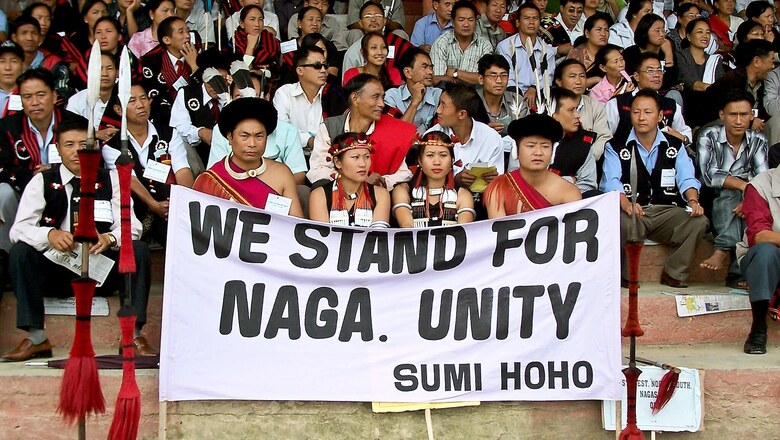
views
Kohima: The decision of Nagaland Assembly Speaker Sharingain Longkumer disallowing any discussion on the SARFAESI Act, 2002 triggered a ruckus on the fifth day of the budget session of the House on Thursday.
As the House gathered after the Question Hour, the speaker announced that Chief Minister Neiphiu Rio would make a statement under Rule 55 pertaining to the Securitisation and Reconstruction of Financial Assets and Enforcement of Securities Interest (SARFAESI) Act, 2002.
However, opposition MLA Chotisuh Sazo said during the Assembly's Business Advisor Committee (BAC) meeting, it was admitted and listed in Thursday's list of business for discussion, but was suddenly withdrawn.
This was a direct denial of the rights of the members, Sazo said, adding that the opposition wanted to raise important issues in public interest but the members of the ruling party did not want to discuss such issues. Opposition Leader T R Zeliang also voiced support for Sazo.
He said the opposition did not have any objection to a statement from the Leader of the House (LoH) on the issue, but a discussion should be allowed after it. Zeliang said whether the House accepted the Act or not was the issue.
"If we accept it, implement it. If we do not, it should go to the Select Committee, which will seek legal advice from the advocate general. But without doing that, the law and justice department has written to the finance department, following which banks have stopped giving loans to anybody on mortgaging of land and property," he said, adding that this was why they wanted to highlight the grievances of people.
As Rio stood up to make the statement, Zeliang said the issue was raised by the opposition and not the government. He asked why the LoH should make a statement on it.
However, the Chief Minister urged the opposition to let him make the statement and after that, if they had anything to say, they could seek time and the Assembly could allot a different time-slot for discussion.
The speaker insisted that any clarification sought could be discussed in his chamber but nothing would be clarified in the Well of the House as he could not allow any discussion during the session. Urging the speaker to allow the members to speak, MLA Imkong L Imchen said it was the House of the people, but was flatly rejected by the former.
Rio supported the speaker, saying no discussion was required. Making the statement on the SARFAESI Act, he said it could not be implemented in Nagaland in its present form since there would be a direct conflict with the land holding systems and restrictions on transfer of land.
Rio said on July 19 last year, the justice and law department had advised the finance department, clearly stating that the SARFAESI Act, 2002 could not be enforced in Nagaland as its provisions were conflicting with all existing protective laws, including Article 371A of the Constitution, which gave special provisions to the Nagas, the Bengal Eastern Frontier Regulation, 1873 and the Nagaland Land and Revenue Regulation (Amendment) Act, 1978.
Rio stated that in October last year, the cabinet had examined the SARFAESI Act and decided that it could be adopted in Nagaland only after it was ensured that transfer of property attached by banks was made to the indigenous inhabitants of the state.
Being a central Act, the requisite amendment had to be carried out by the Centre, he said, adding that the state's finance department on November 22 last year had requested the Department of Financial Services of the Government of India to modify the Act to restrict transfer of property to the indigenous inhabitants of Nagaland and a reply was still awaited.
Rio also questioned Zeliang's sense of emergency, saying he was the chief minister for four years since 2014 and at that time, the matter was not discussed. After Rio's statement, the speaker did not allow any discussion. Nonetheless, Zeliang said if it could not be allowed on Thursday, it should be taken up within the next two days, before the session got over, as the next session would be held in July-August and it would amount to denying the members of their rights.
The statement made by the LoH was totally misguiding, he said, adding that people had stopped getting bank loans while students were also not getting education loans since July 19 last year because of the letter of the law and justice department to the finance department with a copy endorsed to the State Level Bankers Committee.
The finance department was yet to reply to the letter, Zeliang said. He sought a clarification from the LoH, asking whether the law and justice department had written to the finance department based on a cabinet decision or a decision of the House.
Otherwise, the House alone was empowered to reject any Act passed by Parliament and not by any department, he said. Zeliang also said Nagaland had its own law -- the Nagaland Land and Revenue Regulation Act, 2002 -- which clearly stated that land or property could be mortgaged and sold to the indigenous people.
Responding to Zeliang's claim that banks were not giving loans, the chief minister said the government had not received any complaint in this regard.



















Comments
0 comment